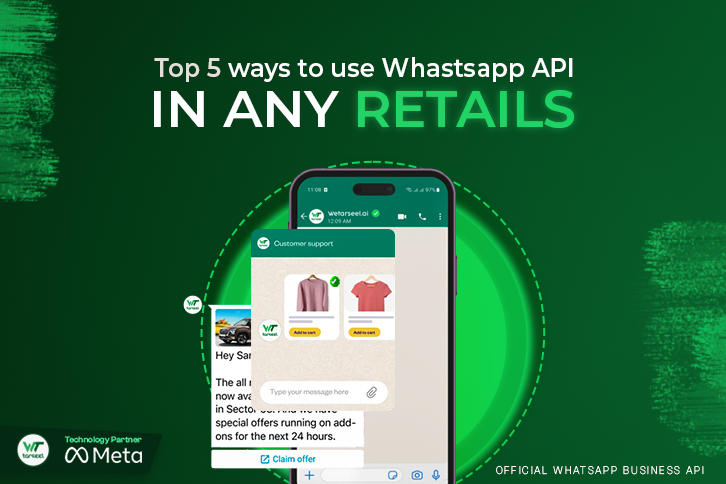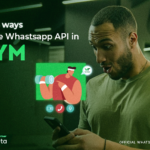66% of users have made a purchase after chatting with a brand on WhatsApp
That single number shows just how powerful the WhatsApp Business API can be for retailers. It’s a direct sales driver, capable of turning casual conversations into conversions.
Let’s say you walk into a shop, and before you even ask, the people there already know what you are looking for.
Feels good, right?
Now, what if you could give your customers that same experience, but on their phones? That’s exactly what WhatsApp Business API for retail helps with.
It’s not just about sending random messages. It’s about making every chat feel natural, helpful, and personal. But how can retailers actually use it to stay ahead? Let’s get into it.
Retailers today need more than just a good product. They need to engage customers at the right time, in the right way. WhatsApp Business API helps brands do this by offering a direct and personal way to communicate. Whether it’s providing updates, offering personalized deals, or making the shopping experience smoother, WhatsApp can be a game-changer.
Here are five smart ways retailers can use WhatsApp API to stay ahead.
1- Hyper-Personalisation: More Than Just Using Someone’s Name
These days, just adding a customer’s name to a message isn’t enough. People want offers and suggestions that actually make sense for them. WhatsApp API can help by letting you:
- Send offers based on what they’ve looked at or bought before
- Use chatbots that suggest products instantly, like a helpful store assistant
- Give special discounts or early access to loyal customers
- Recommend complementary products, like a phone case if they just bought a phone
- Send reminders for repeat purchases, like skincare products or groceries
Quick Tip: Keep it personal, but don’t overdo it. Nobody likes feeling like they’re being watched, so always get their permission before sending messages.
2- Making Customer Support Smarter: Is Automation Enough?
WhatsApp API is great for quick replies, but nobody likes talking to a bot all the time. A mix of automation and human support works best.
How retailers can get it right:
- Use smart chatbots for common questions and FAQs
- Make it easy for customers to chat with a real person when needed
- Send real-time updates for delivery delays or order tracking
- Handle complaints faster by letting customers send voice messages instead of typing long texts
- Offer a simple “Call Me” option if a customer needs to talk to an expert
Something to think about: Should brands focus more on fast automated replies or invest in real human conversations? The right balance can turn one-time buyers into loyal customers.
3- Smarter Inventory Updates: Stay Ahead, Not Behind
Nobody likes missing out on a product they really wanted. WhatsApp can help retailers stay ahead.
How it helps:
- Let customers know when out-of-stock items are available again
- Send alerts when popular products are running low
- Give loyal customers early access to new launches
- Allow customers to set “notify me” alerts for products they’re waiting for
- Share real-time stock updates for limited-edition or seasonal products
Expert tip: Too many alerts can be annoying. The trick is to send only useful updates based on what customers are actually interested in.
4- Reducing Cart Abandonment: A Small Push Can Make a Big Difference
People often add things to their cart and then forget about them. WhatsApp API can help bring them back.
How it works:
- Send gentle reminders about items left in the cart
- Offer a small discount to encourage them to complete the purchase
- Suggest similar products to help them decide
- Let them know if stock is running low so they don’t miss out
- Give them the option to ask questions about the product before buying
Pro tip: Don’t keep spamming customers. A well-timed, friendly reminder works much better than constant nudges.
5- Collecting Feedback: Build Trust, Not Just Data
Getting customer feedback is important, but nobody likes filling long surveys. WhatsApp makes it easy.
How retailers can use it:
- Quick feedback requests after a purchase
- Simple polls to understand customer preferences
- Small rewards or loyalty points for sharing their thoughts
- Let customers give feedback using emojis or star ratings instead of long responses
- Ask for reviews and testimonials in a non-pushy way
Expert tip: Asking for feedback is good, but acting on it is even better. Let customers know when you make changes based on their input. This builds trust and keeps them coming back.
Sharing Product Catalogs: Let Customers Browse Without Leaving WhatsApp
Retailers can now showcase their products inside WhatsApp chats. Instead of asking customers to visit a website, they can:
- Share a product catalog directly in the chat
- Let customers add items to their cart inside WhatsApp
- Answer product-related questions instantly
- Offer a seamless shopping experience without making customers switch apps
Marketing tip: Customers are more likely to buy when they don’t have to click through multiple pages to find what they need.
Easy Payments & Order Confirmations: A Faster Way to Buy
WhatsApp API also makes checkout smoother by:
- Sending payment links directly in the chat
- Offering cash-on-delivery confirmation before dispatching an order
- Instantly sending digital invoices or receipts
- Updating customers about refunds or returns
Quick win: The fewer steps between a customer and their purchase, the better.
Is WhatsApp API the Future of Retail Communication?
There’s no doubt WhatsApp API can help retailers grow, but using it smartly is what really makes the difference. The key is balancing personal engagement while respecting customer space.
By using solutions like Wetasreel Business API, businesses can make the most of WhatsApp without overwhelming their customers.
So, ready to take your retail game to the next level?





